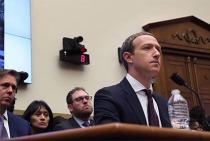America and China should cooperate in space. Although the United States can no longer take its extraterrestrial dominance for granted, it remains the leading player, while China’s space capabilities are growing fast. Most important, both countries, along with the rest of the world, would benefit from a set of clear rules governing the exploration and commercialization of space. By Anne-Marie Slaughter and Emily Lawrence.
You are here
Results for Op-Ed Innovation & Technology
Wednesday 10 February 2021
Washington DC, U.S.A
Thursday 26 December 2019
Oxford, United Kingdom
The United States and some of its allies have acted decisively to exclude the Chinese technology company Huawei from their national markets, yet they continue to ignore the similar threat posed by Facebook and other US digital giants. Democratic governments must now be equally decisive in dealing with this home-grown danger. By Ngaire Woods.
Monday 16 September 2019
London, United Kingdom
The global transition from carbon-intensive fossil fuels to cleaner, more reliable renewables like wind and solar is already well underway. But the big question – for the 2020s and beyond – is how fast it will happen. A slow transition would mean that energy-sector incumbents continue to flourish, and we would all but certainly miss the emissions-reduction targets enshrined in the 2015 Paris climate agreement. But if the transition is rapid, incumbents will experience varying degrees of disruption – the price of keeping the Paris targets well within reach. As matters stand, both scenarios are possible, representing two paths that lie before us.
Monday 12 August 2019
Cambridge-MA, USA
Digital technology has transformed how we communicate, commute, shop, learn, and entertain ourselves. But the current problems afflicting social media are a perfect example of what can happen when uniform rules are imposed with no regard for social context and evolved behaviors. The rich and variegated patterns of communication that exist off-line have been replaced by scripted, standardized, and limited modes of communication on platforms such as Facebook and Twitter. As a result, the nuances of face-to-face communication, and of news mediated by trusted outlets, have been obliterated. Efforts to “connect the world” with technology have created a morass of propaganda, disinformation, hate speech, and bullying. By Daron Acemoglu.
Saturday 20 July 2019
New Delhi, India
Fifty years after astronauts first walked on the Moon, space wars have gone from Hollywood fantasy to looming threat. Not content with possessing enough nuclear weapons to wipe out all life on Earth many times over, major powers are rapidly militarizing space. Given the world’s increasing reliance on space-based assets, the risks are enormous. by Brahma Chellaney.
Tuesday 25 June 2019
Manchester, United Kingdom
Although the idea of the Internet “making the world a better place” is often ridiculed today, it’s easy to forget that this decade began amid optimism that new technologies would connect people, broaden access to information, and generate abundant new economic opportunities. Today, however, governments around the world are considering policies that would undermine the Internet’s openness and global reach. By Shamel Azmeh
Wednesday 13 March 2019
New York, USA
Climate change poses an unprecedented threat to humanity, one that appears increasingly likely to reduce global standards of living dramatically within our lifetime, and cause untold damage in the longer term. And, because addressing such a daunting planetary challenge requires radical approaches, there have been wide-ranging discussions about what the world must urgently do to limit the rise in global temperature to less than 1.5°C above pre-industrial levels. By Ban Ki-moon.
Saturday 16 June 2018
Cambridge-MA, USA
In the middle of the twentieth century, people feared that advances in computers and communications would lead to the type of centralized control depicted in George Orwell’s 1984. Today, billions of people have eagerly put Big Brother in their pockets. By Joseph S. Nye
Wednesday 1 November 2017
Geneva, Switzerland
Perhaps the most enduring lesson of Luther’s call for a scholarly debate – and his use of technology to deliver his views – is that it failed. Instead of a series of public discussions about the Church’s evolving authority, the Protestant Reformation became a bitter battle played out via mass communication .... The question today is how we can ensure that new technologies support constructive debate. The world remains full of heresies that threaten our identities and cherished institutions; the difficulty is to view them not as ideas that must be violently suppressed, but as opportunities to understand where and how current institutions are excluding people or failing to deliver promised benefits. By Nicholas Davis.
Friday 5 May 2017
Oxford, United Kingdom
Artificial Intelligence is the next technological frontier, and it has the potential to make or break the world order. The AI revolution could pull the “bottom billion” out of poverty and transform dysfunctional institutions, or it could entrench injustice and increase inequality. The outcome will depend on how we manage the coming changes.













